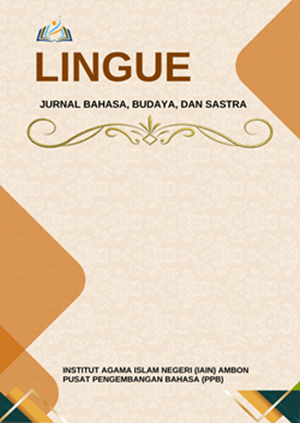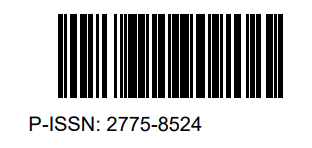INTEGRATING HOTS IN INDONESIAN HIGH SCHOOL TEXTBOOKS: A COMPARATIVE STUDY OF THE 2013 AND MERDEKA CURRICULUM
DOI:
https://doi.org/10.33477/lingue.v7i1.9426Keywords:
higher order thinking skills, 2013 curriculum, merdeka curriculumAbstract
This study evaluates and compares the integration of Higher Order Thinking Skills (HOTS) in Indonesian language textbooks for high school students under the 2013 Curriculum and the Merdeka Curriculum. Using a qualitative descriptive approach, the study conducts content analysis of four textbooks two aligned with the 2013 Curriculum and two with the Merdeka Curriculum employing HOTS criteria derived from Bloom’s taxonomy. The findings reveal that the 2013 Curriculum textbook (2014 edition) includes 78 questions, with 17 in the analyzing category and 37 in the evaluating category (32 checking and 24 criticizing questions). In comparison, the Merdeka Curriculum textbook (2021 edition) presents 55 questions, comprising 14 analyzing and 32 evaluating questions (25 checking and 16 criticizing). Despite a decrease in the total number of questions, the Merdeka Curriculum exhibits a greater emphasis on deeper critical evaluation, reflecting a pedagogical shift toward fostering students' critical thinking competencies. The contribution of this research lies in providing empirical evidence on how curriculum reforms affect the cognitive depth of textbook content, thereby offering insights for curriculum developers, textbook authors, and educators in designing learning materials that effectively promote 21st-century skills.
References
Anderson, L. W., & Krathwohl, D. R. (2015). A taxonomy for learning, teaching, and assessing: A revision of Bloom's taxonomy of educational objectives. NewYork, NY: Longman. https://doi.org/10.4324/9781410600284.
Arikunto, S. (2014). Prosedur penelitian: Suatu pendekatan praktik. Rineka Cipta.
Ariyana, Y., Bestary, R., & Mohandas, R. (2018). Buku pegangan pembelajaran berorientasi pada keterampilan berpikir tingkat tinggi. Jakarta: Direktorat Jenderal Guru dan Tenaga Kependidikan, Kementerian Pendidikan dan Kebudayaan.
Azis, Abdul, dkk. 2020. “Analisis Soal Higher Order Thinking Skills (HOTS) pada Buku Teks Bahasa Indonesia SMA”, Laporan Hasil Penelitian. Makassar: LP2M UNM Makassar.
Azis, Abdul, dkk. 2020. Evaluasi Penerapan HOTS dalam Buku Teks Bahasa Indonsia SMA Analisis Perbandingan: Kurikulum 2013 dan Kurikulum Merdeka. Journal of Indonesian Language Education and Literature, 6(1), 1-8. https://doi.org/10.24235/ileal.v6i1.7335.
Budiman, A., & Jailani. (2014). The importance of higher order thinking skills in education. International Journal of Education and Learning, 6(1), 45-50.
Chandra, T., Dwi, H., & Saputra, A. (2019). Evaluasi keterampilan berpikir kritis siswa pada mata pelajaran matematika di Jawa Timur. Journal of Mathematics Education, 11(2), 210-222.
https://doi.org/10.22342/jme.11.2.8383.210-222.
Hartini, S., Kurniawan, B., & Fadilah, N. (2021). Instrumen penilaian HOTS dalam pembelajaran di sekolah dasar. Jurnal Penelitian dan Evaluasi Pendidikan, 15(1), 75-87. https://doi.org/10.21831/pep.v15i1.35030.
Heong, Y. M., Othman, W. B., Yunos, J. B. M., Hassan, R. B., Mohamad, M. M. B., & Mohd, N. H. B. (2012). The level of Marzano higher order thinking skills among technical education students. International Journal of Social Science and Humanity, 2(2), 121-125:
https://doi.org/10.7763/IJSSH 2012.V2.95.
Kemala. (2021). Analisis HOTS (high order thinking skills) pada soal subjektif tes dalam mata pelajaran bahasa Indonesia pada kelas V SD Negeri 24 Kota Bengkulu. Journal of Basic Education, 10(3), 55-67.
Kemendikbud. (2017). Modul penyusunan soal Higher Order Thinking Skills (HOTS).
Jakarta: Dirjen Pendidikan Dasar dan Menengah.
Lie, A., Hasanah, F., & Lestari, B. (2020). Enhancing HOTS in language learning: A framework for educators. Journal of Advanced Educational Research, 1(1), 12-23.
Purwaningsih. (2022). Analisis butir soal dalam buku bahasa Indonesia SMA.
Sholikha, H., & Fitrayati, N. (2021). The role of teachers and textbooks in facilitating higher order thinking skills. Journal of Education and Practice, 12(7), 45-53.
Sugiyono. (2013). Metode penelitian kuantitatif, kualitatif, dan R&D. Bandung: Alfabeta.
Suhady, D., et al. (2020). Higher order thinking skills in the 21st century education.
Educational Researchand Reviews, 15 (7), 435-445. https://doi.org/10.5897/ERR2020.4001.
Sumadi. (2020). Analisis soal tipe HOTS (higher order thinking skills) mata pelajaran bahasa Indonesia pada naskah soal penilaian akhir semester ganjil kelas IV MI Ma’arif Tingkir Lor Kota Salatiga tahun pelajaran 2019/2020. Journal of Indonesian Education Research, 8(2), 90-101.
Suprayitno, S. (2019). PISA 2018 results: A review of Indonesian students’ performance. Journal of Educational Research and Evaluation, 5(1), 53-61. https://doi.org/10.22236/JER_Vol5Issue1pp53-61.
Yuliandini, T., Kusumaningsih, W., & Purwanto, B. (2019). Evaluasi implementasi Kurikulum 2013 dalam meningkatkan kualitas pendidikan. Jurnal Pendidikan dan Kebudayaan, 4(2), 35-47.
Dewi, W. C., & Novita, P. (2024). Teachers ’ Perspectives On Enhancing Students ’ Hots In Reading-Writing Integration At The Secondary Level. JNPM (Jurnal Nasional Pendidikan Matematika), 2023, 163–177.
Faradella, N. E., Wiyaka, W., & Egar, N. (2024). Teachers’ strategies and challenges in conducting HOTS-based activities in Merdeka Curriculum era. ` Indonesian Journal of Education and Pedagogy, 1(2 SE-), 75–90. https://doi.org/10.61251/ijoep.v1i2.64.
Junaedi, I. (2025). Mathematical Literacy: A Comparative Analysis of School Mathematics Curricula in Indonesia,Singapore, and China. Inovasi Matematika (Inomatika), 7(1), 105–129. https://doi.org/10.35438/inomatika.v7i1.488.
Manalu, S., Afrida, N., & Harahap, S. (2025). Higher Order Thinking Skills in Reading Questions of English Textbook for 10 th Grade High School Students. Invention: Journal Research and Education Studies, 6(3), 139–154.
Marunduri, S. W., Sipayung, K. T., & Sinambela, E. (2024). Empowering Reading Comprehency Unleashing High-Order Thinking Skill (Hots) Strategies In Kurikulum Merdeka For Eleventh GradersAt Sma Swasta Pembda 1 Gunungsitoli. Academic Journal Perspective :Education, Language, andLiterature, 12(1 SE-), 25–44. https://www.ejournalugj.com/index.php/Perspective/article/view/9474.
Nurhikmah, N. (2024). Character Education Islam From the Views of Imam Al- Ghazali. Jurnal Al Burhan, 4(1), 53–66. https://doi.org/10.58988/jab.v4i1.300.
Resty Panginan, V., & Susianti, S. (2022). Pengaruh Penerapan Kurikulum Merdeka Belajar terhadap Hasil Belajar Matematika Ditinjau dari Perbandingan Penerapan Kurikulum 2013. Jurnal PGSD Universitas Lamappapoleonro, 1(1), 9–16. https://doi.org/10.57093/jpgsdunipol.v1i1.7.
Wibowo, S. E., Saptono, B., Hastomo, A., Herwin, & Ardiansyah, A. R. (2023). The Challenges of Implementing the Independent Curriculum in Indonesian Language Learning in Elementary School High Classes. Jurnal Ilmiah Sekolah Dasar, 7(3 SE- Articles), 536–545. https://doi.org/10.23887/jisd.v7i3.59167.
Widiastuti, M. K., & Mbato, C. L. (2025). LOTS and HOTS reading questions in EFL textbooks (Kurikulum Merdeka): unveiling every learning process purposes. JOALL (Journal of Applied Linguistics and Literature), 10(1 SE-Regular Articles), 48–70.
Yarun, A., Moch. Zainal Arifin Hasan, Syahri, S., & Markus, M. (2023). Higher Order Thinking Skill (HOTS) Students in Indonesia and Saudi Arabia (Comparative Study of Assessment Application in Schools). Journal of Contemporary Islamic Education, 3(2 SE-Articles), 96–109. https://doi.org/10.25217/jcie.v3i2.3787.
Downloads
Published
How to Cite
Issue
Section
License
If accepted for publication, the copyright of the article belongs to the author. Copyright includes the exclusive right to reproduce or transmit manuscripts in any form and media: reprint, produce photographs, microfilm, or translated versions of the manuscript. Increasing parts of this journal, storage and transmission of databases of any form or media, such as electronic copies, electrostatic and mechanical copies, photocopies, recordings, magnetic media and so on are permitted without permission. LINGUE: Jurnal Bahasa, Budaya dan Sastra, allow readers to read, download, copy, distribute, print, search, or link the fulltext of its articles and allow readers to use them for any other lawful purpose. However, it can not be used for commercial purposes
Jika diterima untuk publikasi, hak cipta artikel adalah milik penulis. Hak Cipta mencakup hak eksklusif untuk mereproduksi atau mengirimkan manuskrip dalam bentuk dan media apa pun: mencetak ulang, menghasilkan foto, mikrofilm, atau versi terjemahan dari manuskrip tersebut. Memperbanyak bagian jurnal ini, penyimpanan dan transmisi database dalam bentuk atau media apa pun, seperti salinan elektronik, salinan elektrostatis dan mekanis, fotokopi, rekaman, media magnetis, dan sebagainya diizinkan tanpa izin. LINGUE: Jurnal Bahasa,Budaya dan Sastra, memungkinkan pembaca untuk membaca, mengunduh, menyalin, mendistribusikan, mencetak, mencari, atau menautkan teks lengkap artikelnya dan memungkinkan pembaca untuk menggunakannya untuk tujuan yang sah lainnya. Namun, tidak dapat digunakan untuk tujuan komersial

LINGUE : Jurnal Bahasa, Budaya, dan Sastra Ciptaan disebarluaskan di bawah Lisensi Creative Commons Atribusi-TanpaTurunan 4.0 Internasional.







